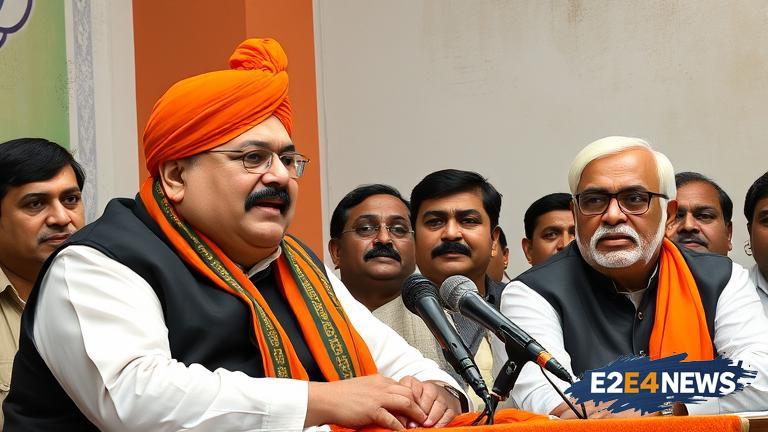In a recent statement, Bharatiya Janata Party (BJP) President JP Nadda expressed his disappointment with the opposition parties in India, stating that they have failed to perform their duties as a responsible opposition. Nadda criticized the opposition for their inability to engage in constructive debates and discussions, instead resorting to personal attacks and criticism. He emphasized the importance of a strong and effective opposition in a democratic system, highlighting their role in holding the government accountable and providing alternative policies. Nadda offered to provide tuition to the opposition on how to work effectively as an opposition, citing the BJP’s experience in this regard. He pointed out that during the BJP’s tenure as the opposition, they had successfully raised important issues and held the government accountable. Nadda also highlighted the BJP’s commitment to democratic values and principles, emphasizing the need for constructive opposition. The BJP President’s statement has sparked a debate on the role of the opposition in Indian politics, with many analysts arguing that the opposition parties need to rethink their strategy and approach. The opposition parties have been criticized for their lack of unity and cohesion, with many parties having different agendas and ideologies. Nadda’s offer to provide tuition has been seen as a move to highlight the BJP’s strength and experience in governance, as well as to expose the opposition’s weaknesses. The statement has also been interpreted as a reflection of the BJP’s confidence in their ability to govern effectively, with many seeing it as a sign of their preparedness for the upcoming elections. The opposition parties have responded to Nadda’s statement, with some leaders accusing him of being arrogant and dismissive. However, others have welcomed Nadda’s offer, stating that they are willing to learn from the BJP’s experience. The debate on the role of the opposition in Indian politics is likely to continue, with many seeing it as an important issue that needs to be addressed. The effectiveness of the opposition is crucial in a democratic system, as it provides a check on the government’s power and ensures that the voices of all citizens are heard. Nadda’s statement has highlighted the need for a strong and responsible opposition, and it remains to be seen how the opposition parties will respond to this challenge. The BJP’s experience as an opposition party has been cited as an example of how to effectively hold the government accountable, and it is likely that other parties will look to learn from their approach. The importance of constructive opposition cannot be overstated, as it provides an alternative perspective and ensures that the government is held accountable for their actions. Nadda’s offer to provide tuition has been seen as a move to promote democratic values and principles, and it is likely that it will have a significant impact on the political landscape in India. The statement has also been interpreted as a reflection of the BJP’s commitment to good governance, with many seeing it as a sign of their dedication to democratic principles. The opposition parties will need to rethink their strategy and approach if they are to provide an effective opposition, and it remains to be seen how they will respond to Nadda’s challenge. The debate on the role of the opposition in Indian politics is likely to continue, with many seeing it as an important issue that needs to be addressed. The effectiveness of the opposition is crucial in a democratic system, and it is likely that Nadda’s statement will have a significant impact on the political landscape in India.





